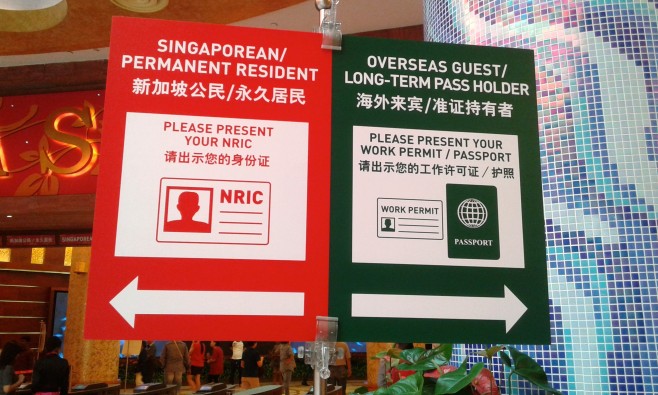Singapore lawmaker proposes hike in casino levy
Oct 09, 2014 Newsdesk Latest News, Singapore, Top of the deck

A lawmaker in Singapore has proposed increasing the casino entry levy imposed on Singapore citizens and permanent residents.
Denise Phua Lay Peng also suggested introducing an ‘opt-in’ system whereby only those Singaporeans that formally register an interest in gambling at the city-state’s two casino resorts would be allowed to do so, reported the Malay Mail.
Her comments came during debate in Singapore’s parliament on a bill to regulate remote gambling in the country. The report didn’t mention by how much she wished to see the levy increased.
The entry levy for Singaporeans has been at the same level since the two casino venues – Resorts World Sentosa, operated by Genting Singapore Plc, and Marina Bay Sands, run by Las Vegas Sands Corp – opened in the first half of 2010. The entry fee is SGD100 (US$79) per 24-hour period, or SGD2,000 for a one-year pass.
Although the levy has stayed the same, the government has introduced incremental changes to the rules governing how the casinos can market their services to local players.
The policy aim of the authorities in instituting the casino policy was to expand tax take and spending by inbound tourists, rather than to redistribute the savings of its own lower- and middle-class citizens.
Analysts have noted that the earnings of the Singapore casinos have not seen the kind of incremental rises witnessed until recently in Macau.
In the second quarter of 2014, Genting Singapore’s net profit actually fell 22 percent year-on-year, largely due to greater than expected impairment charges on receivables – mainly in the form of debt owed by VIP gamblers.
In September 2010, only months after the resorts opened, the authorities barred the casinos from running free shuttle buses from so-called ‘Heartlands’ areas of public housing.
Changes have also been made to the country’s Casino Control Act. Section 54 of the Act as amended in late 2012 says that operators can be fined up to 10 percent of annual gross gaming revenue for a “serious breach” of the Act, without defining what counts as “serious”.
In May 2013, S Iswaran, Minister in the Prime Minister’s Office and Second Minister for Home Affairs, said Singapore’s Casino Regulatory Authority had stepped up its presence on the gaming floors of the city’s two gambling resorts.
And at the end of that month, Singapore announced a system whereby individuals, or the family of vulnerable individuals, could apply to the country’s National Council on Problem Gambling to have a limit placed on their casino trips.
In November last year, it was announced that RWS and MBS had each been fined six-figure sums for entry levy offences reported or detected between May 1 to December 31, 2012.
In May this year, the government announced it had introduced a centralised system for self-exclusion. In September it was announced that non-casino gaming operators in the city had also joined the scheme.
Lawmakers in Japan – who have made frequent reference to the ‘Singapore model’ of casino regulation when debating the possibility of legalising casinos in that country – on Tuesday heard a proposal to make any Japanese casinos for foreigners-only.
Related articles
-
 MBS Tower 3 rooms revamp now by 2Q...
MBS Tower 3 rooms revamp now by 2Q...Jul 25, 2024
-
 Sands China 2Q EBITDA down q-o-q amid...
Sands China 2Q EBITDA down q-o-q amid...Jul 25, 2024
More news
-
 Donaco EBITDA up y-o-y to above US$4mln...
Donaco EBITDA up y-o-y to above US$4mln...Jul 26, 2024
-
 HK listed Palasino upgrades Czech...
HK listed Palasino upgrades Czech...Jul 26, 2024
Latest News
Jul 26, 2024
Border-casino operator Donaco International Ltd has achieved a 164.17-percent year-on-year increase in its latest quarterly group earnings before interest, taxation, depreciation and amortisation...Sign up to our FREE Newsletter
 (Click here for more)
(Click here for more)
Pick of the Day
”We’ve got more traction outside of Macau at the moment. But Macau’s going be a bigger focus for us”
David Punter
Regional representative at Konami Australia
Most Popular
 Sheraton brand to exit Londoner Macao, to be Londoner Grand July 25, 2024
Sheraton brand to exit Londoner Macao, to be Londoner Grand July 25, 2024  Macau regulator probes unlicensed gaming agents July 24, 2024
Macau regulator probes unlicensed gaming agents July 24, 2024  Philippines gives 20k aliens in POGOs 60 days to leave July 25, 2024
Philippines gives 20k aliens in POGOs 60 days to leave July 25, 2024  Philippines-listed DigiPlus says not affected by POGO ban July 24, 2024
Philippines-listed DigiPlus says not affected by POGO ban July 24, 2024  Sands China 2Q EBITDA down q-o-q amid low hold, renovation July 25, 2024
Sands China 2Q EBITDA down q-o-q amid low hold, renovation July 25, 2024






